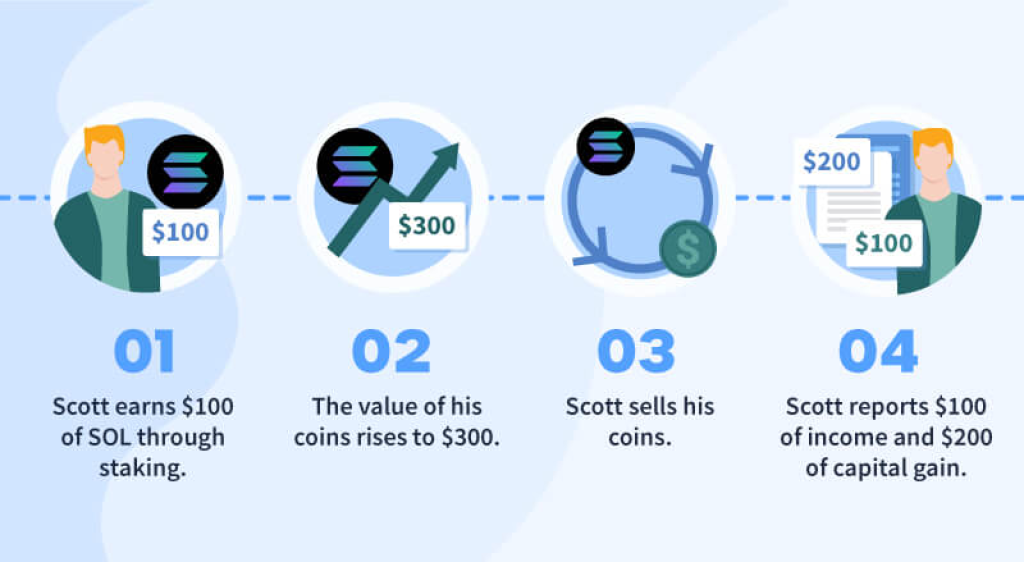
Almost any activity you do in crypto involves some kind of transaction to be recorded on the blockchain. And any kind of transaction is an alert for tax authorities to come and get their piece of your pie. Staking is no exception to this so here is a guide on how to pay taxes on your staking activities.
Crypto staking rewards are considered taxable income when you gain “dominion and control” over them, meaning you can transfer, sell, or use them without restrictions.
What you'll learn 👉
What is staking?
In Proof of Stake blockchains protocols like Solana and Cardano (and since September 2022 Ethereum as well), transactions are validated by stakeholders.
In exchange for locking up some of their wealth and securing a blockchain, stakeholders receive a percentage of network transaction fees. The whole process is called staking and plays the same role as mining does in the bitcoin ecosystem.

How is staking taxed?
The IRS has not issued explicit guidelines regarding how staking is taxed, however, most tax experts believe that rewards are taxable as income at the time it is received rather than when it is distributed. This is because the IRS treats cryptos like property, according to the Tax Foundation.
In addition, the IRS considers crypto to be treated as capital gains when you trade or spend crypto to buy something, which is subject to taxation at ordinary rates.
How to Stake Crypto Coins?
There are two main ways to stake crypto, depending on where you store it. They are:
- Non-custodial wallet
- via Third-Party
Non-custodial wallet
This is a non-custodial wallet (you control the seed words and thus the coins) that makes it possible for you to trade cryptos via decentralized exchanges and protocols without having to rely on centralized exchanges or custodians.
These wallets are known as “non-custodial“, meaning that they do not hold your funds on their servers. Instead, they are just a tool which allows you to interact with the blockchain and all your data is kept locally on your device.

Via Third-party
When you use a third-party wallet, you are giving that third party permission to the custody of your funds. This indicates that they will handle all of your financial dealings in the same manner as a traditional bank would. Kraken and Coinbase are just two examples of some of the most well-known third parties. In several jurisdictions, crypto staking taxes depend on whether you utilize a PoS or a third party.
Learn more about staking on Kraken, staking on Coinbase, staking on Kucoin. Also, check this guide to see what is the best platform to stake crypto.
Do I have to pay taxes if I sell my staking rewards?
The sale of stake rewards is a taxable event in the same way that the sale of any other crypto would be.
You will have a capital gain or loss on your capital account depending on how much your stake awards have increased or decreased in value since you first received them. The cost basis here can be calculated as the fair market value of your rewards as of the date of receipt.
How is Staking Taxed in the US?
It’s true that the IRS has issued instructions for reporting crypto mining income, but it has yet to do so for staking.
Some simple guidelines exist for crypto mining. Any crypto mined must be reported and taxed at their full fair market value. The capital gains tax is due if you make a profit through its use, exchange, or sale.
This has led many investors to incorrectly assume that staking is taxed at the same rate as mining.
How is Crypto Staking Taxed in Canada?
The Canadian Revenue Agency has not specifically addressed how it treats cryptos received from staking. But given the similarities between staking and mining, the safest approach is to treat received coins as assets.
Like with mining, the crypto that you receive from staking must be treated differently depending on whether the mining activity is a hobby or a business.
Those who mine crypto as a hobby must pay Capital Gains Tax on any profits (CGT). Because the crypto was free, there was no cost basis. Mining as a business has different tax consequences.
Read more about the best tools to report crypto taxes in Canada.
How is Crypto Staking Taxed in the UK?
According to HM Revenue & Customs (HMRC) crypto guidance, everyone participating in the process of staking tokens – including those who hold them, are rewarded for holding them, or are paid to stake them – may face taxation.
Staking actions may be subject to taxation depending on whether or not the document states that staking “amounts to a taxable trade.” That, in turn, is contingent upon a variety of elements, such as the specifics of the organization and the commercial nature of its operations.
If staking is not considered to be a taxable transaction, the pound sterling value is taxed as miscellaneous income. When the property is sold, capital gains tax will be levied.
How is Crypto Staking Taxed in Australia?
The Australian Taxation Office (ATO) has suggested that the Australian dollar worth of awards received by taxpayers participating in crypto-staking activities will be taxed as ordinary income rather than capital gains at the time of receipt.
According to the ATO, this applies to both prizes paid to participants and those paid to third parties operating on their behalf. Individuals who operate as ‘validators,’ or persons who participate in consensus methods, are among those who receive incentives.
This approach is consistent with long-standing tax law concepts about the derivation of ordinary income, i.e., the receipt of a reward for delivering services. When the property is sold, Capital Gains Tax will be levied.
Read more about the best tools to report crypto taxes in Australia.
When should I recognize income from my staking rewards?
Staking income should be recognized when it is received. This includes both the amount you receive and the timing of receiving those funds. However, there are exceptions to this rule. Some investors who earn staking revenues through a third party do not know whether they should report income when the rewards are generated or when they withdraw their earnings into a personal wallet.
To help clarify when income is considered taxable, it’s helpful to think about the concept of “dominion and control.”

Experts believe that staked rewards will be considered received for tax purposes when investors have dominion and full authority over their coins. They earn money when they may freely trade and swap them.
Once investors withdraw staking earnings, the IRS may allege they have “dominion and control.” Whether the coins are in your wallet or a third party’s, you may realize income.
Do I pay taxes if I run a staking business?
If you run a staking business in the United States, you are required to file and pay income tax on the whole amount of profit you made from staking.
Are there any situations where staking rewards are non-taxable?
It’s prudent to treat staking rewards as taxable income and report them as such.
In the event that the staked reward cannot be withdrawn, a more aggressive strategy would be to argue that it is not taxable.
It’s important to note that while certain services already allow users to stake ether, withdrawals were unavailable for ETH stakers until the whole migration to Ethereum 2.0 was complete. These situations frequently lead to claims that the owner lacks “domination and control” over their monetary assets.
Learn more about how to report taxes on other crypto activities:
How are staking pools taxed?
Even if you choose not to cash out your bonuses immediately upon receipt, you should still consider the staking rewards you earn from your mining pool to be revenue. As was previously said, as long as you can withdraw your money, you have “dominion and control” over them.
In contrast, the act of adding or removing crypto from a staking pool is probably not regarded as a taxable event.
What if I can’t determine the fair market value of my staking rewards?
Fair value for staking rewards obtained at the time of receipt can be hard to assess in some circumstances, such as when you receive your reward from a mining pool.
Such a scenario calls for the adoption of crypto accounting software like CoinLedger. You can see how much more or less your stake is worth now than when you earned it, thanks to an integrated historical price engine that determines the true value of staked rewards over time.
Can I deduct staking equipment?
Large initial investments in equipment like staking hardware are fully deductible in the United States if you run a staking business in the same vein as a Bitcoin mining operation. Moreover, your operational expenses, such as electricity, may be tax deductible, reducing your final tax liability. Individuals cannot deduct investment costs under current tax legislation.
How to report staking rewards on your tax return?
Individuals who invest in crypto can declare them on Schedule 1 of Form 1040 as “Other Income.” Businesses that earn staked crypto as part of their business can deduct staking expenses under Schedule C. Staking costs may also be deducted (provided they can be proved and they are a necessary expense of business operations).
Best tools to report crypto staking tax?
Aside of the already mentioned Coinledger, other good options that account for staking when creating your crypto tax reports include:
- Koinly – most popular crypto tax calculator
- Zenledger
- Cointracking







